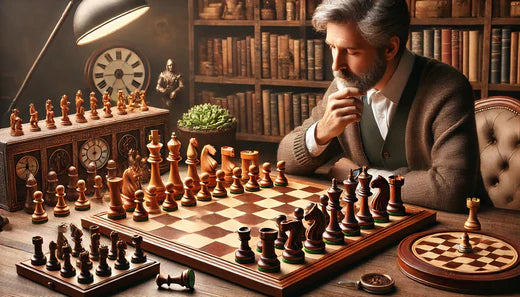From its enigmatic origins in ancient times to its modern iterations played around the globe, the history of chess is as rich and varied as the strategies employed on the board. Join us as we explore the fascinating evolution of chess and its enduring significance in today’s world.
The Ancient Origins of Chess
In order to understand the rich history of chess, we first need to explore its origins, which are steeped in mystery and debate. Historical evidence suggests that the game we know and love today has roots dating back to around the 6th century AD. The earliest precursors of chess emerged in India, where a game called Chaturanga was played.
Chaturanga: The Birth of Strategy
Chaturanga was a game of four divisions of military, represented by pieces that moved in a manner reminiscent of modern chess. It was played on an 8x8 board and is widely regarded as the cornerstone of chess as we know it today. The game's mechanics were alluring enough to capture the interest of neighbouring cultures.
The Spread of Chess Across Continents
As trade routes expanded, so too did the popularity of chess. From India, it travelled to Persia, where it was called Shāh Māt, meaning "the king is dead"—thus giving rise to the game's modern name. When the Arabs invaded Persia, they embraced Shāh Māt, further popularising it across the Islamic world. By the 8th century, chess had made its way into Europe, beginning a new chapter in its rich history.
Chess in Medieval Europe
During the Middle Ages, chess became widely played among European nobility, evolving in its popularity and strategic complexity. The pieces began to take on the characteristics we’re familiar with today: the king, queen, bishops, knights, rooks, and pawns each coming into their own significance. The queen's newfound power was particularly paramount, symbolising women’s influence during a time of societal change.
The Rise of Chess Literature
As chess grew more popular in European courts, so did the literature surrounding it. By the 15th century, instructional manuals and treatises began to emerge, offering insights into advanced chess strategies and techniques.
The First Chess Manuals
One of the earliest notable manuals was “The Game of Chess” by Francesco Ramelli, published in 1561. This work, along with others, helped disseminate key strategies and further ensconced chess as a vital intellectual pursuit.
Modern Chess: Standardisation and International Tournaments
As centuries passed, chess transformed into the game we recognise today. The 19th century marked a significant turning point, primarily due to the endeavours to standardise the rules of chess. This movement enabled the establishment of international competitions that celebrated the sport.
The First Official World Chess Championship
The inaugural World Chess Championship took place in 1886 between Wilhelm Steinitz and Johannes Zukertort. Steinitz emerged victorious, laying the groundwork for an annual tradition that continues to this day, culminating in high-stakes matches that capture the attention of audiences worldwide.
Chess and the Digital Age
With the advent of computers and the internet, chess experienced a revolutionary change in the late 20th century. Online chess platforms enabled players to engage in matches across the globe, while AI development led to computer programs capable of competing with human grandmasters.
The Rise of Online Chess Platforms
Platforms like Chess.com and Lichess.org saw a surge in popularity during the early 21st century, allowing players to practise, participate in tournaments, and learn from tutorials. The world's leading individuals and federations embraced digital play, ensuring chess remained relevant in a rapidly changing landscape.
The Impact of Chess Culture
Chess is more than a game; it’s a culture. It has inspired art, literature, and film, transcending the realms of mere entertainment. From the poetic expressions of 19th-century writers to the modern-day streaming of chess tournaments on platforms like Twitch, chess continues to engage individuals of all ages and backgrounds.
Chess in Popular Culture
The recent Netflix miniseries “The Queen’s Gambit” reignited global interest in chess. The portrayal of the struggles and triumphs of protagonist Beth Harmon captivated viewers, leading to a resurgence in chess sales and interest in learning the game.
The Psychological Aspects of Chess
Chess is not just a contest of skills and strategies; it is also a psychological battle. Understanding the intricacies of the game requires an in-depth knowledge of both one’s own strategy and that of the opponent. This complex interplay fosters critical thinking, patience, and concentration among players.
Benefits of Playing Chess
- Cognitive Development: Chess promotes the development of critical thinking skills, improves memory, and enhances problem-solving abilities.
- Emotional Intelligence: The psychological aspects of chess sharpen emotional discipline, fostering resilience and patience.
- Social Skills: Chess facilitates social interaction, promoting camaraderie and competitive spirit among players.
The Future of Chess
As we gaze into the future, the trajectory of chess looks promising. The integration of technology will undoubtedly continue to shape the game, with further innovations expected in e-sports and online tournaments. Advancements in AI will similarly provoke discussions around the nature of intelligence and creativity in a game that has resisted encroachment by digital advancements for so long.
Socio-Cultural Implications
Moreover, chess continues to encourage inclusivity, with various organisations working tirelessly to promote the game among underrepresented groups. Initiatives aimed at introducing chess to schools and communities have grown exponentially, ensuring its legacy carries on for generations to come.
Your Journey Begins
Chess embodies a rich tapestry woven through centuries of cultural significance, strategic brilliance, and intellectual prowess. As you delve into the world of chess, whether you are a beginner or a seasoned player, remember that each game tells a story and each move has the potential to teach a lesson. With its immense history and bright future, chess invites you to not just play, but to become part of its legacy.
Join the chess community. Embrace the challenge. And unleash your strategic genius on the board—who knows what adventures lie in your next game?
Discover the creations of a fellow Shopify store owner by exploring their online store. Simply click here to access the store. Please remember that this is a promotional link, and we cannot be held responsible for the content of the linked store.



